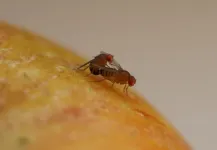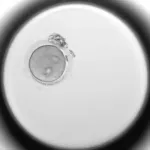(Press-News.org) Genetic quality or genetic compatibility? What do female fruit flies prioritize when mating? Researchers at the University of Zurich show that both factors are important at different stages of the reproductive process and that females use targeted strategies to optimize the fitness of their offspring.
Breeding female fruit flies face a difficult decision: do they mate with the male that has the best genes, or with the one whose genes best match their own? Evolutionary biologists from the University of Zurich and Concordia University have now investigated this question, because, as UZH professor Stefan Lüpold explains, “the processes underlying mate choice influence the evolution of male sexual characteristics and thus the variation within a population – not only in flies”.
Fluorescent sperm reveal reproductive process
The fruit fly Drosophila melanogaster is a common model organism for studying sexual selection and evolution. In this species, males do not provide any material benefits to females, such as food or parental care. But the choice of mates can influence the fitness of the female’s offspring through survival, growth and reproduction.
The research team led by Stefan Lüpold staged competitive matings of fruit flies. The male competitors differed in the quality of their genes and in their genetic compatibility with the target female. Using fluorescently labeled sperm, the researchers tracked the entire reproductive process, from sperm in the female reproductive tract to paternity outcomes.
Pre-selecting at mating, readjusting during sperm storage
This study revealed that both factors – the genetic quality of males and their genetic compatibility with females – influence reproduction, though varying in importance across reproductive stages. For example, males with high-quality genes generally have higher mating success. But females, routinely mating with multiple males, can influence sperm storage and fertilization success by ejecting some of the sperm after mating.
Females appear to delay this sperm ejection if a male has better genes or is more compatible with the female than his predecessor. This gives the preferred sperm more time to enter the female storage organs and displace the rival sperm already residing there. The complex interplay of these processes ultimately affects paternity.
Sophisticated interplay between genetic quality and compatibility
“Our results suggest that female fruit flies use different criteria across stages of the reproductive process to influence the outcome of their mating activity,” says last author Stefan Lüpold. “While choosing mates, they can preselect for males of superior genetic quality and then bias sperm storage to ensure that the most compatible of these fertilize their eggs. This approach might give them the best of both worlds.” According to Lüpold, the study offers new insights into the mechanisms and consequences of mate choice: “It helps us better understand how genes are passed on, genetic variation is maintained within species, and new species may arise.”
END
Genetics of attraction: mate choice in fruit flies
2023-10-02
ELSE PRESS RELEASES FROM THIS DATE:
FAU Engineering study employs deep learning to explain extreme events
2023-10-02
Identifying the underlying cause of extreme events such as floods, heavy downpours or tornados is immensely difficult and can take a concerted effort by scientists over several decades to arrive at feasible physical explanations.
Extreme events cause significant deviation from expected behavior and can dictate the overall outcome for a number of scientific problems and practical situations. For example, practical scenarios where a fundamental understanding of extreme events can be of vital importance include rogue waves in the ocean that could endanger ships and offshore structures or increasingly ...
New study uncovers potential treatment for non-alcoholic fatty liver disease
2023-10-02
A breakthrough study, jointly led by Professor Jang Hyun Choi and Professor Sung Ho Park from the Department of Biological Sciences at UNIST has identified an important factor involved in the development of non-alcoholic fatty liver disease (NAFLD) caused by obesity. The research team discovered that Thrap3, a protein associated with thyroid hormone receptors, plays a significant role in exacerbating NAFLD by inhibiting the activity of adenosine monophosphate-activated protein kinase (AMPK), a key regulator of fat metabolism in the liver.
NAFLD encompasses various metabolic diseases such as fatty hepatitis and cirrhosis resulting from excessive fat accumulation. ...
Susan G. Komen® analysis shows many breast cancer patients struggle to afford basic needs: Housing, transportation, utilities
2023-10-02
Lower income breast cancer patients often struggle to afford life’s necessities such as housing, transportation and utilities due to direct and incidental costs related to their treatment, according to a new analysis by Susan G. Komen®, the world’s leading breast cancer organization. These top needs were identified by Susan G. Komen’s Patient Care Center, which provided nearly $9.1 million in grants to more than 16,000 breast cancer patients from April 1, 2022 to March 31, 2023, as part of Komen’s direct-to-patient ...
Dense measurement network revealed high level of PM2.5 in Punjab due to crop residue burning and its transport to Haryana and Delhi NCR
2023-10-02
A group of international collaborators led by the Research Institute for Humanity and Nature (RIHN) team performed the first quantitative study of air pollution in the north-western India region using 29 low-cost and reliable instruments, demonstrating the advantages of source region observations to link crop residue burning (CRB) and air pollution at local to regional scales.
Exposure to particulate matter less than 2.5 µm in diameter (popularly known as PM2.5) causes health hazards in cities and major emission regions of the world. Although the major sources ...
Next-generation printing: precise and direct, using optical vortices
2023-10-02
Osaka, Japan – Will printed photographs ever match the precision of a mirror's reflection? Even though the answer may still be no for a while, Osaka Metropolitan University scientists have made significant strides in precision printing with their innovative optical vortex laser-based technique that allows for the precise placement of minuscule droplets with micrometer-scale accuracy.
Inkjet technology is a well-known printing technique that emits microdroplets from a nozzle directly onto a surface. However, when the ink droplets are viscous, with high density, ...
Pharmacists can improve access to life-saving vaccines
2023-10-02
HPV, or human papillomavirus, is the most common sexually transmitted infection. It is also the leading cause of cervical cancer. Over 1,400 Canadian women are affected yearly, with almost 400 deaths, according to the Canadian Cancer Society. It is completely preventable with the HPV vaccine, and yet, unfortunately, many people are unvaccinated.
University of Waterloo researchers have found a possible solution to this on-going issues. Using an electronic questionnaire at the time of appointment scheduling for seasonal influenza or COVID-19 vaccines, researchers have found, is a quick and efficient way to identify people in Ontario willing to receive additional life-saving vaccines.
“This ...
Researchers studied thousands of fertility attempts hoping to improve IVF
2023-10-02
By genetically testing nearly one thousand embryos, scientists have provided the most detailed analysis of embryo fate following human in vitro fertilization.
Nearly half the embryos studied underwent developmental arrest because of genetic mishaps in early development — a revealing insight that suggests more IVF babies could come to term with changes in the fertility treatment process. The unique combination of data from arrested embryos also sheds new light on the still largely mysterious earliest stages of pregnancy through natural ...
Precision medicine navigators increase genomic testing rates for Black patients with prostate cancer
2023-10-02
SAN DIEGO, October 1, 2023 — The presence of a clinical navigator to act as a liaison between people with prostate cancer and the health care system greatly increases the likelihood that patients, especially Black patients, will receive advanced testing that can help predict the severity of their disease and guide treatment, a new study suggests.
The study showed patients seen by a precision medicine navigator were substantially more likely to receive genomic testing than those not seen by the navigator. Black patients, whose genomic testing rates traditionally ...
Play in early childhood helps build a better brain, says leading expert
2023-10-02
Dr Jacqueline Harding, director of Tomorrow’s Child and an early childhood expert at Middlesex University, argues that the young child’s brain is inherently designed to be playful and this is crucial for its development.
In her new book, The Brain that Loves to Play, she challenges the traditional division between play and learning, emphasizing the essential role of play in early years education and holistic child development.
With a renewed vision for the fusion of play and learning, the book aims to contribute to the ...
Faith primary schools admitting fewer children with special educational needs
2023-10-02
Faith primary schools are admitting fewer children with special educational needs and disabilities (SEND) than local authority community primaries, according to new research from the London School of Economics and Political Science (LSE).
In research funded by the British Academy, Dr Tammy Campbell analysed Reception year admissions to mainstream state schools from 2010-2020 in England using the National Pupil Database census. She concluded that many faith primary schools ‘serve as hubs of relative advantage, seeming disproportionately to serve ...






